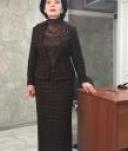|
MAIN PAGE
> Back to contents
Politics and Society
Reference:
Demetradze M.R.
Vertically-ascending strategy and horizontally-descending processes of the transitional period. Institutional and non-institutional processes of modernization
// Politics and Society.
2016. № 2.
P. 197-202.
DOI: 10.7256/2454-0684.2016.2.17192 URL: https://en.nbpublish.com/library_read_article.php?id=17192
Вертикально-восходящая стратегия и горизонтально-нисходящие процессы переходного периода. Институциональные и неинституциональные процессы модернизации
Demetradze Marine Rezoevna
ORCID: 0000-0002-7676-8054
Doctor of Politics
leading scientific researcher, Institute for the Cultural Heritage of the Ministry of Culture; Professor, the department of World Politics and International Relations, Russian Presidential Academy of National Economy and Public Administration
117292, Russia, Moscow, Kosmonavtov str., 2

|
demetradze1959@mail.ru
|
|
 |
Other publications by this author
|
|
|
DOI: 10.7256/2454-0684.2016.2.17192
Received:
06-12-2015
Published:
12-03-2016
Abstract:
The subject of this research is the detection of peculiarities of the transitional period of the post-Soviet societies; the goal of the work is the reduction of the gap between them and the developed countries of the world, as well as the conditions encouraging the growth of the social wellness of the regular members of society and their inclusion into the modern processes of globalization. The author examines the socializing, leading, and adapting mechanisms that determine the strategy of the innovational reforms; categories of the sociocultural space, networking and hierarchical types of organization of the political system, criteria of assessment of the efficiency of the government administration, and others are being featured. The author suggests using the global experience of scientific study of sociocultural processes that would help to establish the work models and hypotheses of control over political processes of the transitional period of the post-Soviet societies. The applied sociological, political, anthropological, and sociocultural methods of the research demonstrated that modernization of the post-Soviet societies requires reforms and giving the processes of transformation the goal-oriented and rational-constructive character. This work analyzes the specificity of the transitional period on the post-Soviet space, as well as the conditions which positively or negatively affect these processes.
References
1. Devoto, F. and Di Tella T. S. (Eds.). (1997) Political Culture, Social Movements and Democratic Transitions in South America in the twentieth Century. Milano Fondazione Ftltrinelli. Alexander J. C. and Colomy P. (Eds.) (1988) Differentiation theory and social change: historical and comparative approaches, New York, Columbia University Press.
2. Almond, G., Flanagan, S. C. and Mundt, R. J. (Eds.). (1973) Crisis, Choice and Change. Historical Studies of Political Development, Boston, Little Brown and Co.// Inkeles, A. and Smith, D. H. (1974) Becoming Modern: Individual Change in Six Developing Countries, Cambridge, MA: Harvard University Press.// Inglehart, R. (1997) Modernization and Post-Modernization. Cultural, Economic and Political Change in 43 Societies, Princeton: Princeton University Press.//.Kroeber, A. L. (1923) Anthropology, New York: Harcourt Brace.//.Machonin, P. (1997) Social Transformation and modernization. Prague: Slon.//.McClelland, D. (1961) The Achieving Society. Princeton: Van Nostrand.//.Myrdal, G. (1968) Asian Drama: an Iquiry in to the Poverty of Nations. New York: panteon.//.Pye, L. W. and Verba, S. (Eds.). (1965) Political Culture and political Development. Princeton: Press.
3. Demetradze M.R. Tsentral'naya zona traditsionnykh sotsiokul'turnykh tsennostei kak informatsionno-kommunikativnyi fenomen. Novye podkhody k izucheniyu traditsii i traditsionalizma (na primere Rossii). Klassifikatsiya traditsionnykh tsennostei. – M.: NB-Media, 2012.
4. Anderson, B. (1991) Imagined Communities, London: Verso.
5. Apter, D. (1965) The Politics of Modernization, Chicago: University of Chicago Press.
6. M. A. Ramonova Sovremennye kontseptsii
i strategii upravleniya v mirovoi politike // Politika i Obshchestvo. - 2011. - 11. - C. 80 - 90.
Link to this article
You can simply select and copy link from below text field.
|
|


